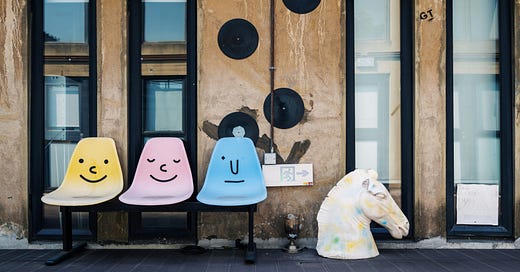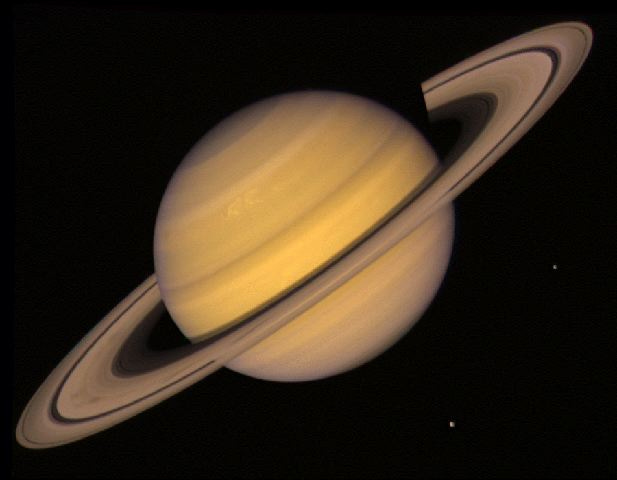Thursday Things is here! This week we rent to win, narrowly survive the Stone Age, and visit the many moons of Saturn.
If you enjoy this edition, please click the heart icon in the header or at the end of the post to let me know.
1933 Old Millfun, Shajing Road, Hongkou District, Shanghai, China, in case you want to sit in these chairs. Photo by Declan Sun on Unsplash
Is it better to rent?
As mentioned in the article below, it is almost considered sacrilege to suggest that renting may be a better investment than owning your own home. Yet in some markets, and in some periods of time, and for some people (because personal circumstances vary), renting can be the better option.
"I have made more money renting": Why buying is not always best
According to a Bankrate study published in 2024, “It’s cheaper to rent than to buy in all of the top 50 metros. The typical monthly mortgage payment of a median-priced home ($412,778, per Redfin) in the U.S. is $2,703, while the national typical monthly rent is $1,979 as of February — a 36.6% difference.”
That’s certainly cheaper out of pocket, but what about building equity?
Personal finance expert and TV host Ramit “I will teach you to be rich” Sethi, has been famously railing against wasting money on homeownership and takes it on in his new book, Money for Couples.
He often gets pushback on his position and implores would-be buyers to do the math before diving in. “You just have to run the numbers, and you have to realize there are lots of ways to build a rich life, whether you own or whether you rent.”
The math doesn’t lie.
“Instead of buying a house, which meant I had to go to fix things and repair things and put money inside, I just simply invested the money, and I have made more money renting for the last 20 years in superior locations with zero maintenance than I would have by owning a place.
As Sethi points out, the key is to invest the money you save by renting. As for that equity:
This is like telling people the sky is green — they simply cannot compute it, and they use the same argument. What about equity? Well, I have equity, too. It just happens to be in the top 500 companies in America.”
Check the records and you’ll see that the stock market beats the housing market over almost every time frame:
Historical data reveals a consistent pattern: While housing prices have generally kept pace with inflation throughout U.S. history, the stock market has typically delivered superior overall returns…
… The S&P 500 index, which tracks the performance of the 500 largest U.S. public companies, has delivered an average annual return of 10.39% (including dividends) from 1992 to 2024, resulting in an inflation-adjusted return of 7.66%. During the same period, the U.S. housing market grew at about 5.5% annually, highlighting stocks' outperformance.1
Sethi’s point — with which I agree — is not that renting and investing the difference in the stock market or some other growth asset is automatically better than owning a home. The point that homeownership is not automatically the best financial option for everyone in every circumstance, even if you can afford it. Sometimes going against the conventional wisdom is where the best opportunities are found.
Close call in the Stone Age
If I’m reading this right, we’re all descended from about 1,280 people because that’s about what the early to middle Pleistocene population of human ancestors was whittled down to.
Early ancestral bottleneck could’ve spelled the end for modern humans
An unexplained gap in the African/Eurasian fossil record may now be explained thanks to a team of researchers from China, Italy and the United States.
I take this to mean there are plenty of human fossils from before and after this gap of about 117,000 years, but far fewer than expected during that period. Suggesting that most of the prior population was wiped out by … something. And we’re all descended from the survivors.
Scientists studied modern day genomic sequences and were somehow able to make inferences about the past population. I’ll have to trust them on that.
These findings indicate that early human ancestors went through a prolonged, severe bottleneck in which approximately 1,280 breeding individuals were able to sustain a population for about 117,000 years. While this research has illuminated some aspects of early to middle Pleistocene ancestors, there are many more questions to be answered since uncovering this information.
Like - was it aliens? Giant spiders? Lizard people?
The results determined using FitCoal to calculate the likelihood for present-day genome sequences found that early human ancestors experienced extreme loss of life and therefore, loss of genetic diversity.
“The gap in the African and Eurasian fossil records can be explained by this bottleneck in the Early Stone Age as chronologically. It coincides with this proposed time period of significant loss of fossil evidence,” says senior author Giorgio Manzi, an anthropologist at Sapienza University of Rome.
More likely culprits for the die off are an Ice Age, droughts, or other climate changes, possibly leading to the loss of food sources. As to how the hardy few managed to survive, it is speculated that control of fire played a role, helping Team Human survive until the climate became more favorable and the population could grow again.
Or maybe we’re just hard to kill.
That was a close one. Photo by Tim Foster on Unsplash
Saturn we have a problem
This item surprised me because I guess my mental map of the Solar System is still stuck at at maybe the 1970s level of astronomy knowledge. I just checked my old Encyclopædia Britannica, and sure enough, Saturn had 10 known moons when I was in elementary school.
And now?
Saturn gains 128 moons, giving it more than the other planets combined
A further 128 moons have been discovered orbiting Saturn, bringing the planet’s total to 274 – more than there are around all the other planets in our solar system combined. But as advances in telescope technology allow us to spot progressively smaller planetary objects, astronomers face a problem: how tiny can a moon be before it is just a rock?
What the heck, Saturn? You’ve turned into some kind of deranged moon hoarder. And don’t even get me started on all the rings. It might be time for the other planets to stage an intervention.
Saturn, about to make another run to the moon store. Image: NASA
This week’s edition is brought to you by Dan’s Advice: Take control of your digital life.
Work apps are essential for productivity, but having too many scattered across your device can create digital chaos. My guide How to Organize Your Work Apps for Maximum Productivity can help you create an environment where your work apps support you rather than overwhelm you.
Thank you for reading!
Please click the hearts, leave a comment, and use the share feature to send this issue to a friend who might enjoy it. See you next Thursday!






